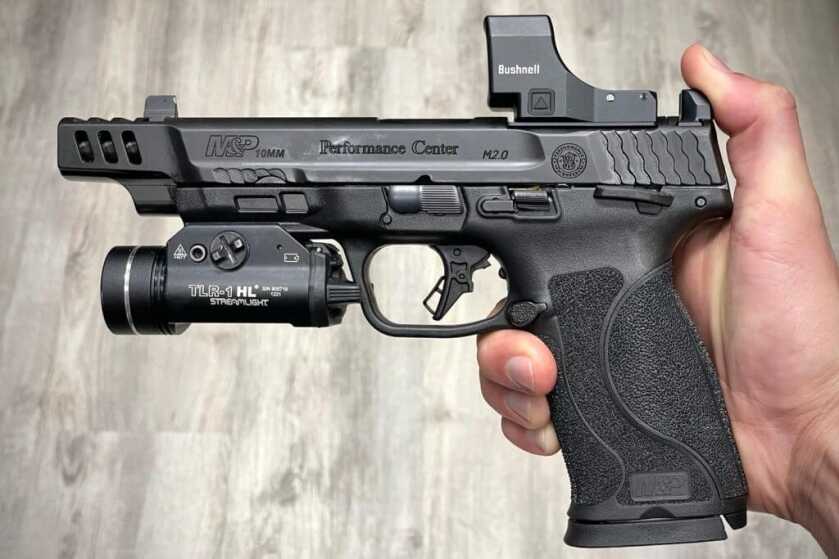
Estimated reading time: 9 minutes
All-new from Bushnell is their RXM-300 Reflex Sight, a game-changing optic crafted for precision and speed in target acquisition. Engineered with a sizable lens, this reflex sight aids in maintaining accuracy even during rapid firing or on-the-move engagements.
Notable features include the RMR footprint, a top-loaded battery offering an impressive 35,000-hour runtime, a precise 4 MOA dot, and versatile modes like shake awake, automatic light sensing brightness adjustments, and button lockout mode that ensures unintentional adjustments are avoided while carrying. The RXM-300 package includes a Picatinny-style low-profile mount and a high-rise spacer, accommodating mounting preferences for rifles or shotguns. Designed with durability in mind, the sight boasts robust housing and carries an IPX7 waterproof rating, reinforcing its claim as a sight “built to win.”
Table of contents
Bushnell RXM-300 Specifications:
Mounting Footprint: RMR Pattern
Form Factor: Open Reflex
Adjustment Range: 100 MOA. Both Windage & Elevation
Click Value: MOA
Dot Color: Red
Magnification: 1x
Min Parallax Distance: Parallax-free design. Optimized at 50 Yards.
Brightness Settings: 12
Reticle: 4 MOA Red Dot
Water Proofing: IPX7
Length: 2.2″
Weight: 1.95 ounces, sight only
MOA Per Rev: 28
Mount: Direct mount to RMR™ Footprint, or Weaver with included base and riser.
Battery Life: Up to 35,000 hours
Shake Awake Feature: Yes
Bushnell Out of the Box
From the factory, the Bushnell RXM-300 comes with everything consumers could ask for. The box includes a low-profile Picatinny mount with an optional high-rise spacer and all necessary screws, optic cover, battery, adjustment tool, torx L-key, cleaning cloth, and user manual.
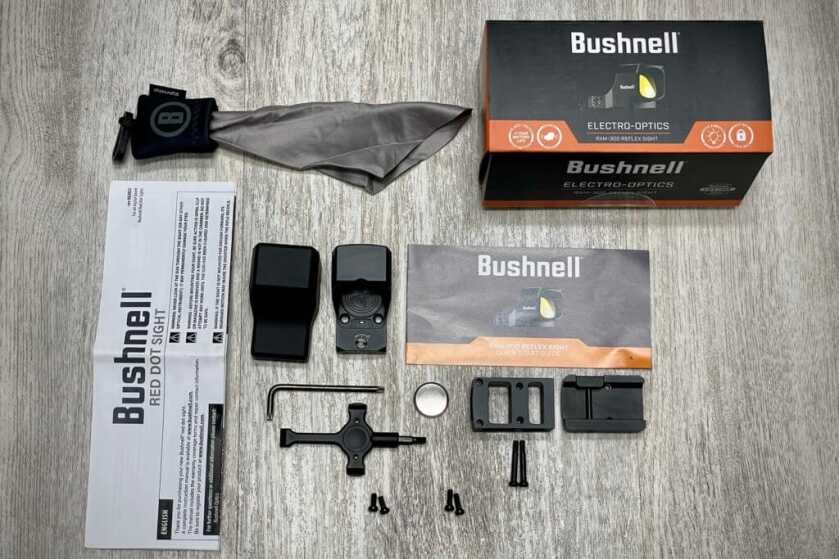
Including a Picatinny mount gives this optic compatibility to be used on carbines right out of the box. This is in addition to being directly mounted to an RMR-compatible pistol slide.
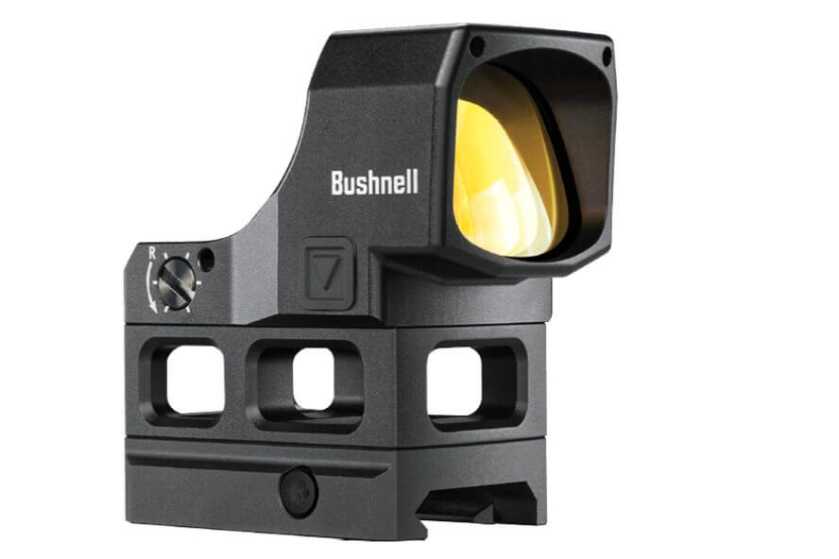
Glass
The standout feature of the RXM-300 in my mind is the size of the lens. Utilizing a Massive 24x28mm window, this optic makes finding the dot and watching it easy even when the slide is reciprocating during shots. The glass features what Bushnell calls an “EXO Barrier.” This is a hydrophobic coating to help keep water, fog, and dust off the exterior glass surface. Throughout my testing, I didn’t notice this providing much-added benefit over other reflex sights. However, I always appreciate any advantage.
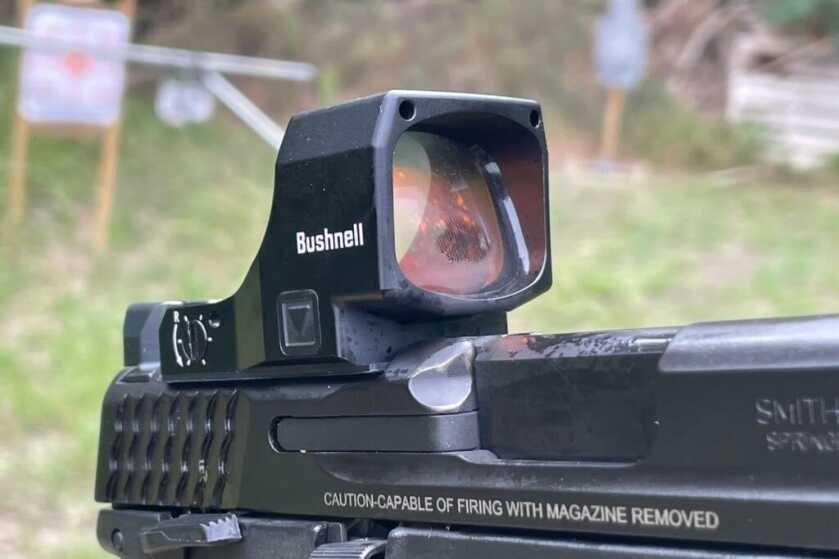
One thing that bothers me with most reflex sights on the market is their tint and distortion. I am happy to report that the RXM-300 has minimal distortion and only a very faint blue hue. This is much better than the Trijicon RMR in both regards. To compare the glass of multiple other optics, I made the image below. The size of the optics isn’t to scale as some were closer or further when taking the picture, but the clarity shows up the same as I see in person.
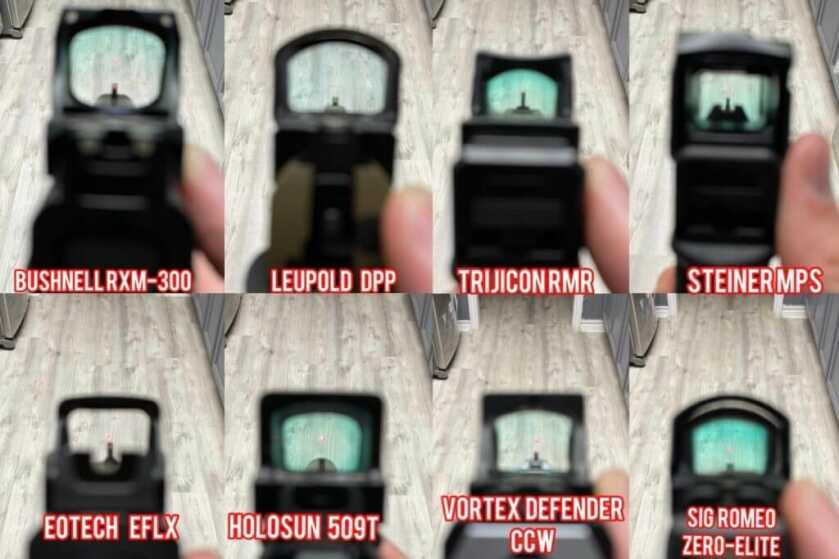
Housing
The 7075-T6 aluminum housing for the RXM-300 is fairly typical for reflex sights, however, it features something new Bushnell is calling “speed holes.” Bushnell drilled these in the top two corners of the housing, designing them as “crumple zones” for severe impacts. I can see the intent of these dampening impact forces to protect the lens, however, I did not bash this optic against concrete to see how well these actually work. Aiming to provide even more protection, the glass window is recessed away from the housing, so racking off objects didn’t even scratch the glass throughout my testing. The housing has an IPX7 rating, enabling the optic to withstand submersion at 1 meter for 30 minutes without causing damage to any of the internal electronics.
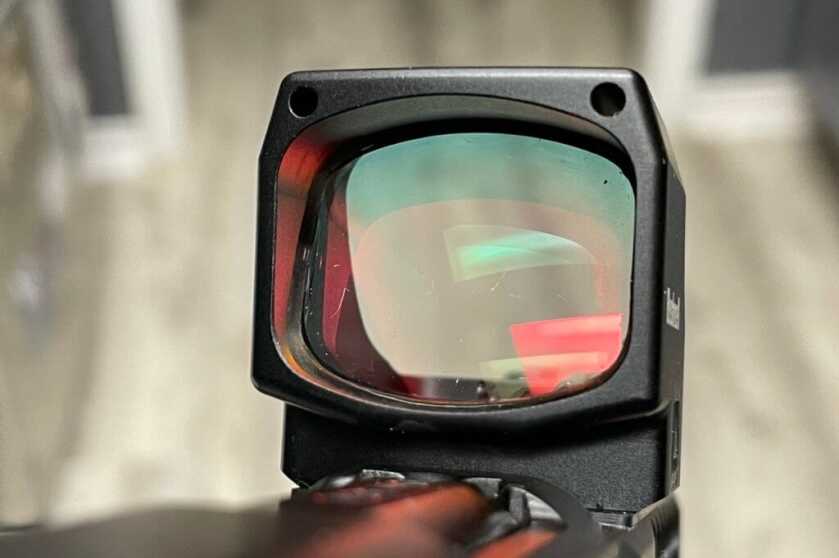
Another thing that looks unique is the hooded geometry. This allows the larger optic to sit in the smaller RMR footprint while accommodating the extra-large lens that sticks out like a hood over the slide. The base of the housing is fairly tall which limits iron sight compatibility, but the suppressor height sights on the 10mm Smith & Wesson Performance Center can just barely be used over the top of the Bushnell RXM-300 base.
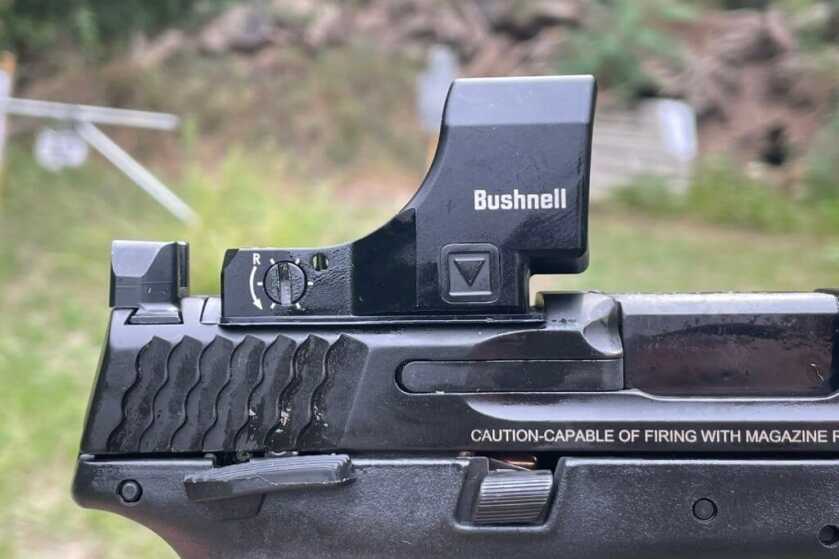
Battery
The RXM-300 utilizes a CR2032 battery and is advertised to provide users with approximately 35,000 hours of runtime at a brightness setting of 6 out of 12. This gives an advertised run time of 4 years of non-stop performance. This is not even factoring in the shake-awake feature which is quite impressive. As a result, frequent battery changes won’t be necessary. However, when you do need to change the battery, the top-loaded battery compartment allows for a quick swap without ever affecting your zero.
READ MORE: Reviewed: Bushnell Prime Spotting Scope
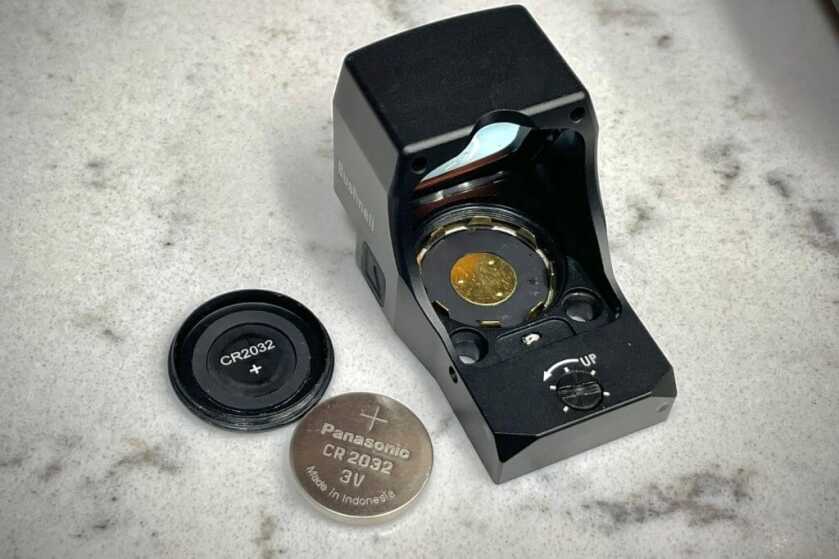
Modes on the Bushnell RXM-300
Bushnell has been listening to what the market is demanding by including a shake-awake feature, and a light-sensing control mode that will automatically adjust the red dots’ brightness based on ambient conditions. You can disable both of these modes to enable constant brightness that users can adjust as needed. For those concealed carrying and worrying about accidentally adjusting the brightness, the Bushnell RXM-300 also features a button lockout mode (LOF). When LOF is engaged, the sight will ignore all button presses except for both the up and down buttons being held for 3 seconds to disengage this mode. All of these modes can be toggled through by holding a combination of one or more of the brightness buttons as defined in the user’s manual.
Buttons
While buttons are just buttons, the brightness adjustments for the RXM-300 are on both the left and right-hand sides of the housing. The up arrow turns the brightness up, and the down arrow turns the brightness down. Bushnell made these sit flush with the side of the housing which helps prevent any accidental adjustments. The adjustments can be harder to find in the dark but feel reliable.
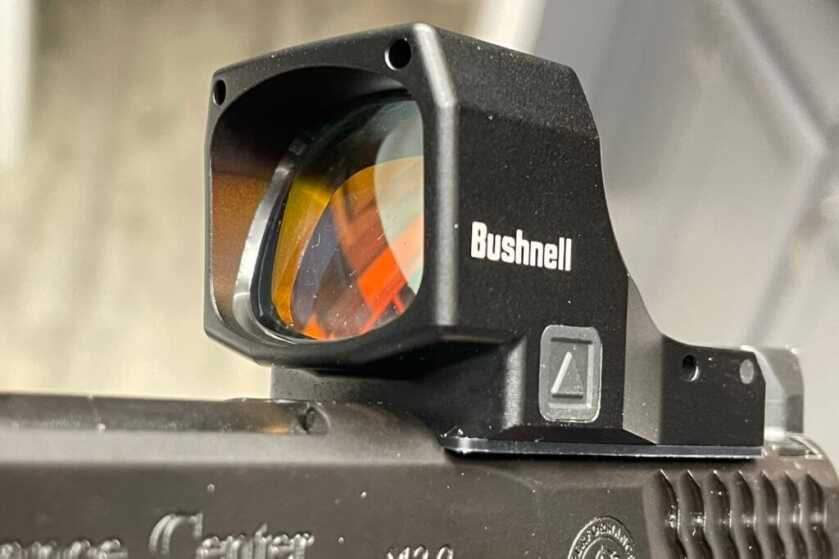
This optic has 12 brightness settings. You can easily toggle through these options by using the up and down buttons on either side of the housing. The brightest setting is definitely daylight bright, and the lowest 2 settings are night vision compatible.
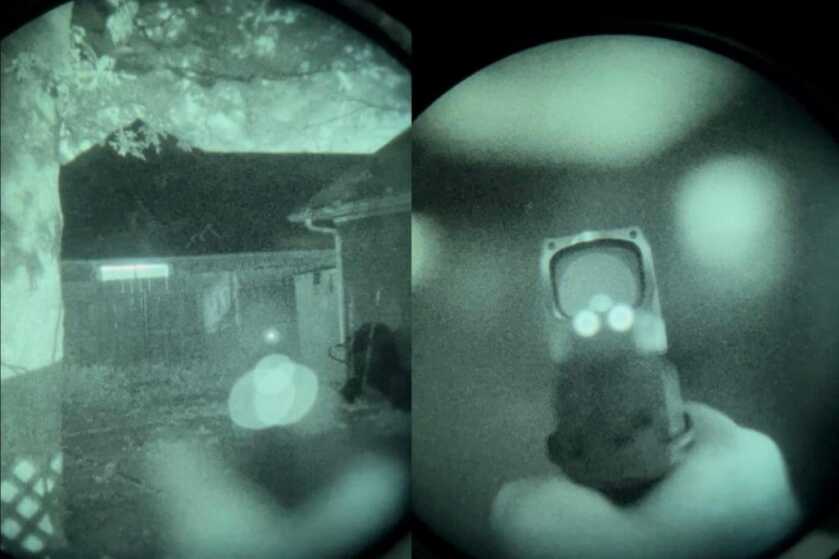
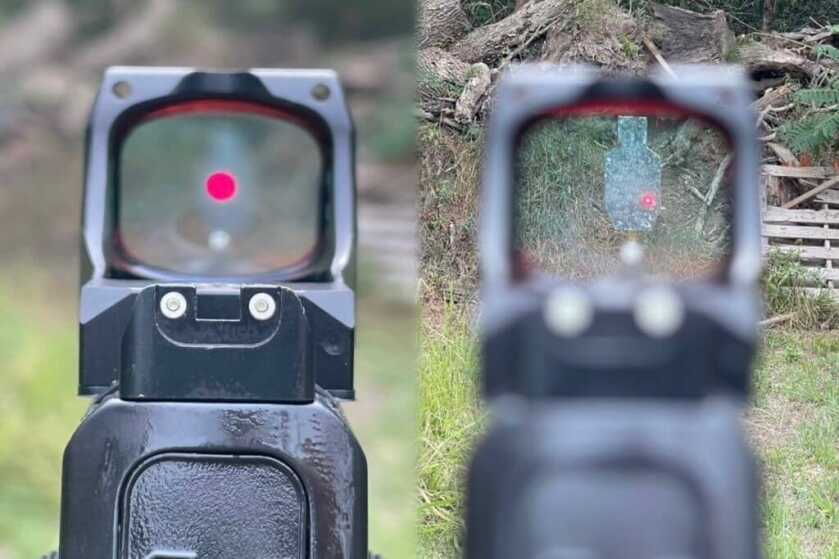
Turrets
To adjust the zero for this optic, Bushnell uses an elevation turret on the top and a windage turret on the right side of the housing. Simply use the etched markings to adjust for the bullet’s point of impact. Once you install it, make adjustments by dialing up and to the right if the first impact is low left. Each click moves the bullet’s point of impact by 1 MOA. Although the turrets are not very tactile, one can slightly feel the clicks when adjusting for windage and elevation.
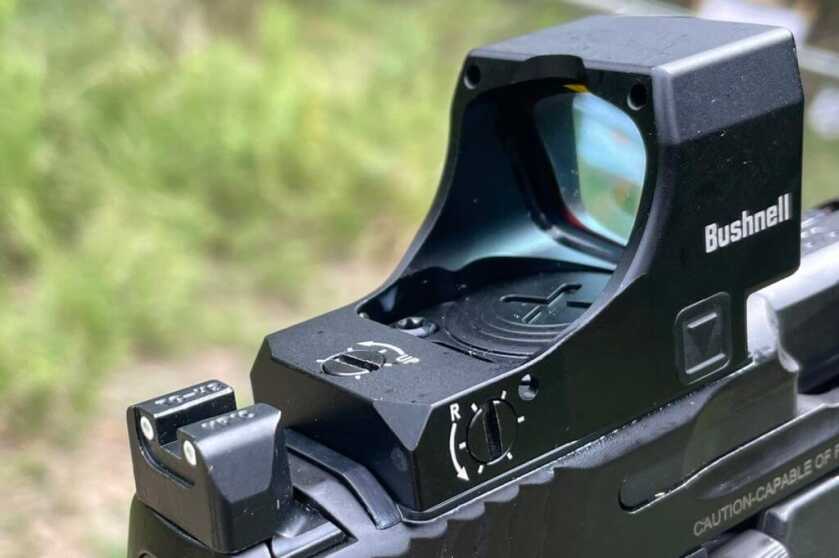
Durability
Aiming to see how well this optic could hold up, I mounted it to a 10mm Smith & Wesson pistol. I then sighted it in, and proceeded to shoot a couple hundred rounds. After running all sorts of drills, I shot groups on paper and my zero hadn’t shifted an inch. I never had any sort of dot flickers or performance issues of any kind.
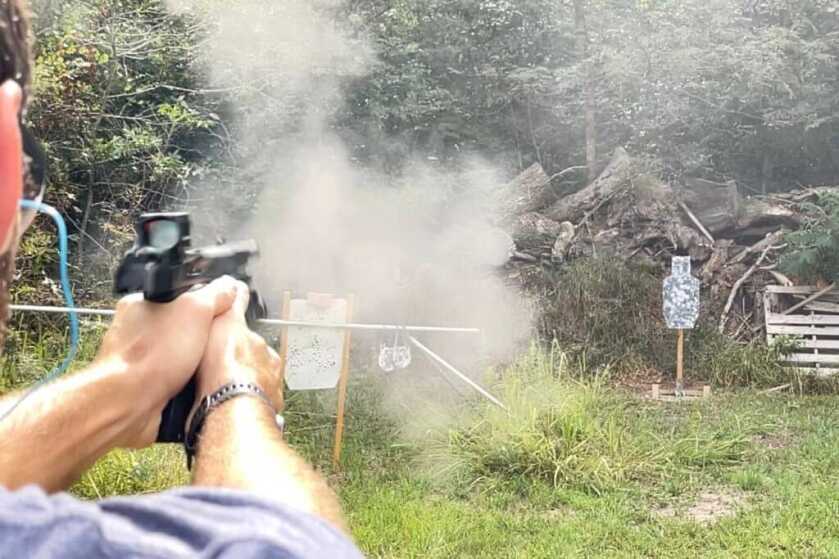
The RXM-300 was a pleasure to shoot, and it has served me well up to this point. For those who want to see a video of this optic in action, I made a short video on my Instagram page as seen below:
Summary of the Bushnell RXM-300
I have really enjoyed my time testing out this reflex sight. The large window has helped me find the dot quickly on draws. It also helps maintain a sight picture even as the slide is recoiling or when shooting on the move. The clear glass also helps keep my full attention on my targets downrange. Overall, I think the new Bushnell RXM-300 packs a lot of performance for the price. It has an MSRP of $299.99 and comes with a Picatinny mount right from the factory. The red dot utilizes the common Trijicon RMR footprint and features a top-loaded battery. Offering a larger window than the Holosun 507 Comp, at a fraction of the price and including Picatinny mounts makes this a tough product to beat.
*** Buy and Sell on GunsAmerica! ***











